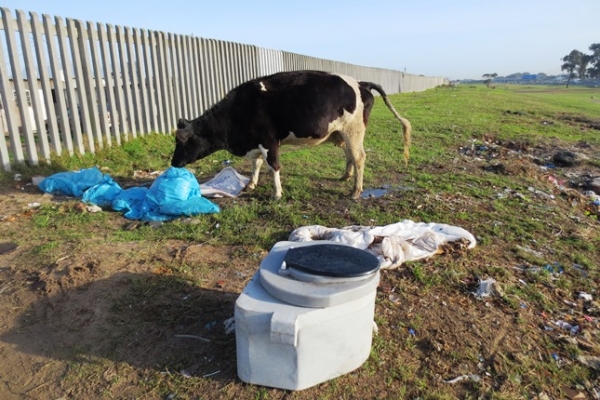

Plastic bags filled with human waste and a portable loo near the N2. Picture by Nombulelo Damba-Hendrik.
18 June 2015
At 4am on Wednesday, Cape Town police used teargas and rubber bullets to prevent a group of about 50 residents from Barcelona informal settlement dumping buckets full of human waste onto the N2 highway. Residents said their buckets have not been collected or cleaned for the past four months.
According to an eyewitness, the protest was the second time Barcelona residents tried to close the N2 with human waste. Last week Thursday, the same group of residents closed the highway with bucket toilets.
The trouble arose after the contracts of 45 people hired under the Expanded Public Works Programme (EPWP) came to an end.
Barcelona is one of the areas where the poo protest of 2013 started. Workers demanded a wage increase from Sannicare (at the time the company contracted by the City of Cape Town to clean the buckets). The protesters were later led by poo protestors Seskhona’s Andile Lili and Loyiso Nkohla.
Community leader Bongani Ngcombolo told GroundUp that since the 2013 strike by Sannicare employees demanding a wage increase, there hasn’t been any proper plan to clean bucket toilets in Barcelona.
He said there was a truck hired by the City to collect the buckets; then, the EPWP (Extended Public Works Programme) took over.
“We only sent one group of 45 people [to the EPWP]. They only worked for two months and two weeks, then their contract ended. When we sent the second group, they were told that they will only work for three weeks,” said Ngcombolo.
He said residents rejected the three-week contracts. They demanded Sannicare hire the same people who went on strike. According to Ngcombolo, there have been no negotiations between community leaders and the EPWP.
He said dumping faeces on the N2 is their only solution for now, until the City comes forward with a proper plan.
GroundUp met two women hired to wash the toilets. They asked not to be named. They said full buckets make their job very difficult.
“This is a very sad situation. I’m sick as we speak and I have to work because I need the money,” said one, a mother of a five-year-old boy.
The woman said she was on the side of the residents who went to throw the buckets on the N2.
“It’s been four months living with faeces next to our houses,” said the woman.
She described how they moved the buckets.
“Some of us decided to empty using the blue plastics [plastic bags] because we still need the buckets. We then dragged the plastic to N2. At least there, the City of Cape Town will clean them,” she said.
GroundUp found blue plastic bags full of human waste dumped next to N2. The smell was unbearable. Some of the residents said they no longer use their bucket toilets, but prefer to relieve themselves next to the N2.
“Imagine living with this bad smell for months. You can’t even spend a minute. Then how do you think we survive this?” asked a woman.
According to Barcelona residents, one bucket toilet is used by at least eight families. The woman said the toilets used to be cleaned every day.
A resident who only identified herself as Thandeka agreed with Ngcombolo, saying the group supposed to take over months ago had refused after they were told that they would only work for three weeks.
“What kind of a contract only lasts for three weeks?” asked Thandeka.
GroundUp has been awaiting comment from the City and the police since yesterday.